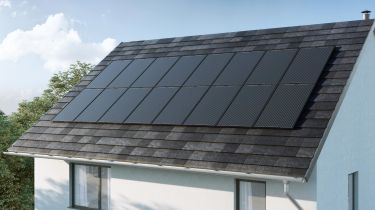Can solar panels charge an electric car?
Charging an electric car with solar panels is a great way to save money and reduce your environmental impact from driving – here’s how it works

Electric cars are considered to be zero-emissions vehicles but fuelling them still has an environmental impact. Most EVs are charged using the National Grid, which still gets a large amount of its energy from power stations burning fossil fuels. Therefore owners charging their electric cars are still indirectly responsible for some harmful emissions. Thankfully, with the advancement of solar panel tech, it’s easier than ever to make sure your car is charged using clean energy from the sun instead.
Fossil fuels are still used heavily around the world to produce enough power for society to function as it does. In the 12 months up to May 2024, 31.7 per cent of the electricity powering UK National Grid was generated from fossil fuels and 37.8 per cent was produced using renewable energy sources like wind and solar. Nuclear energy and biomass derived power made a combined 20.5 per cent and the last 10 per cent was brought in from other countries, with France and Norway being our biggest suppliers.
Solar power isn’t used widely for large-scale power generation in the UK, largely because we don’t have the weather for it, although it is growing as a power source. Over the 12 months to April 2024 only 4.8 per-cent of the UKs energy was provided by solar power. Wind power is much more practical here as a renewable form of power, producing 31.6 per-cent of our electricity over the same period, but solar can still be really useful, especially on a more local level.
A simple and easy way to ensure your electric car isn’t contributing to the production of emissions at power plants is to choose a home electricity provider that only buys from renewable sources. There are plenty of environmentally friendly electricity tariffs to choose from now, including those from the likes of Octopus Energy and Ecotricity.
If you want to be more devoted to clean energy and save some money as well, you could consider charging your electric car using your own solar panels. It sounds complicated but the process of installing solar panels at home is getting easier all the time. Read on to find out more about charging an electric car using solar power.
Solar panels for EV charging
Domestic solar panels are usually fixed to the roof of your house to generate electricity from the sun's solar energy, which can then be used to charge your car. The amount of power generated depends on the available light and sunshine, but also on the number of panels you install. As a general rule, around 10 panels are enough to charge an average-sized car battery, but if you have a larger EV with a big battery you may need more to generate enough power.
Solar panels generate electricity but they can’t store it unless you also install a battery system into your home, but that can prove to be expensive. All the power being generated can be used in your home or to charge your car - and there are apps and devices to help allocate the power from your panels - but you won’t be able to charge your car at night unless you can store energy generated during daylight hours.
Building a solar-powered EV charging station
The great news is that there are pieces of equipment that can assist you in making the most of the electricity generated by solar panels. You can store energy in a battery connected to your solar power system, which is a device offered by a number of providers including E.ON, EDF, Moixa and Tesla.
A battery system is beneficial as it can store excess energy from the solar panels, and allow that energy to be used when the solar panels aren’t able to generate any energy. Without the battery system, solar panels can only be used to charge your car while power is actually being generated.
To efficiently charge an electric vehicle using solar panels, you will also have to install a home charging unit and a PV inverter unit that converts the solar energy into DC current for the vehicle. There are several of these systems available for purchase already, some of which combine both of these elements in one box. However, there's no standalone solar-powered charging system available – rather, it must be integrated with the rest of your domestic power supply system.
These systems don’t come cheap, though. Depending on which wallbox you buy, prices range from a couple of hundred pounds for the most basic 3kW systems, rising to close to four figures for the most advanced 22kW units. Solar panels are expensive, too. A 3kW system with eight panels taking up 16 square metres costs between £7,000 and £8,000. Bigger systems cost more.
A 3kW system is estimated to generate around 2,550kWh of energy output a year: that could fully charge a Honda e roughly 72 times over the course of 12 months. This translates to some 9,750 miles of driving range. If your annual mileage is relatively low, solar panels could be a great long-term solution. It's worth noting, however, that the average domestic solar-panel installation doesn't produce enough electricity in a day to fully charge an electric car so higher mileage drivers will still need to draw power from the National Grid.
How long does it take to charge an electric car using solar power and what are the savings?
This depends on the amount of sunlight on a given day, the type of panels on your roof and the type of wallbox charger you have. We visited one electric-car owner, Warren Philips of Shoreham-on-Sea, who uses solar panels to charge his Renault ZOE. On a sunny day, the panels on his roof can generate upwards of 40kWh of electricity, enough to charge the 40kWh battery in his car.
Most electric-car charging at home happens overnight, when there’s no sun to generate free electricity. This is why it’s worth considering installing a home battery system – like a Tesla Powerwall – to store the solar energy to recharge your car.
Tesla Powerwall battery
Tesla's system utilises a 13.5kWh battery that can provide a charge of up to 7kW, or 5kW continuously. The current cost of a single battery is almost £5,800 (not including VAT), but that doesn’t include fitting. The battery can be mounted inside or outside your home, either on the floor or on a wall, while up to 10 can be installed together to increase storage capacity.
Similar, less expensive systems are available from a number of other suppliers: Moixa offers batteries in three capacities (4.8, 7.2 and 9.6kWh) with the entry level 4.8kWh costing £4,450 including fitting and VAT. While suppliers including e.on and first4solar.co.uk use GivEnergy batteries which are available in a range of capacities.
This is another added expense but over a course of many years, the savings can significantly outweigh the costs. Another electric-car owner we spoke with, Warren Philips, estimated that he will be £13,000 better off in 20 years' time after installing his solar panels, wallbox charger and Tesla Powerwall.
